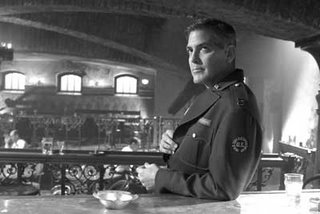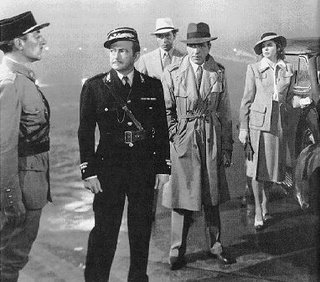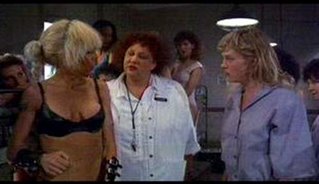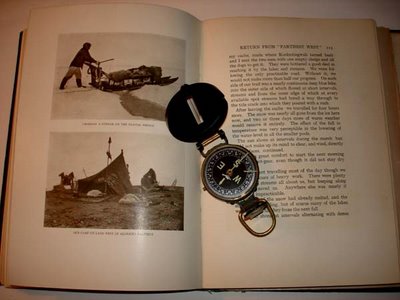Wednesday, January 31, 2007
Tuesday, January 30, 2007
The Good Geman, Or
"What's A Nice Girl Like You
Doing In A Sewer Like This?

What's to like about this movie:
* George Clooney's slick, witty patter.
* Seeing Robin Weigert (the actress who played a very plain, drunk Calamity Jane in HBO's Deadwood) pulling a 180 and playing a ham loving German stripper.
* Watching Stalin smoke a cigarette on old war footage from Potsdam.
* Noirish lit backdrops reminiscent of the moody clouds and ruins seen in paintings by Gainsborough, Reynolds and Constable.
* Seamed stockings.
* Cate Blanchett evoking the spirit of Marlene Dietrich
What's not to like:
* George Clooney's slick, witty patter. Ozeans Elf! :::snapping heels:::
* A heightened reminder that Tobey McGuire in black and white movies (Sin City) is very good at playing psychopathic creeps.
* Bad German accents.
* No Claude Rains.
* The distraction of comparisons to so many other films in that genre, but in particular, Casablanca, Chinatown, Judgment at Nuremberg and The Third Man. To wit:
 Pinched nose actor/director Roman Polanski
Pinched nose actor/director Roman Polanski"Don't go sticking your ear in other people's business, kitty kat."
 "You turned in how many of your Jewish countrymen
"You turned in how many of your Jewish countrymento save your own ass? This is the end of a beautiful friendship."
Sunday, January 28, 2007
Friday, January 26, 2007
Vice President Of Blog Marketing

When did vice president come to mean "I'm not a secretary?" It seems in the past two months, I've stumbled on four vice presidents of marketing, research, development and sales. It costs the company nothing to call you the vice president of anything. Call me vice president of cluelessness to this trend.
Is Cheney the influence? Vice Presidency equals power? Cheney is running the country and the President is his hand puppet? ...and who knows where that hand has been.
Thursday, January 25, 2007
Saturday, January 20, 2007
Friday, January 19, 2007
Thursday, January 18, 2007
Wednesday, January 17, 2007
Tuesday, January 16, 2007
Monday, January 15, 2007
Sunday, January 14, 2007
Saturday, January 13, 2007
Empty Boxes
I stopped by my local Whole Foods last night to stock up on my healthy eats for the coming week, and I happened to visit the ladies room. I realized later, by posting this, that I am showing some men something they may never have seen before:
 That, Gentlemen, is a sanitary napkin-tampon vending machine and it hangs on the wall, but this is what had me really laughing:
That, Gentlemen, is a sanitary napkin-tampon vending machine and it hangs on the wall, but this is what had me really laughing:

If you click on the photograph to make it larger, you can read, "Do Not Force Knob If Empty. Call Matron or Custodian." Matron? Custodian? Those guys mopping floors don't have it rough enough already? As for Matron, I had images of British nurse supervisors or prison guards. All I could think of was "women behind bars" movies like Caged Heat, or Reform School Girls with the late Wendy O. Williams.
Did you know that in 1946 Walt Disney did an animated film for Kotex called, The Story of Menstruation?
Oh yeah...
 That, Gentlemen, is a sanitary napkin-tampon vending machine and it hangs on the wall, but this is what had me really laughing:
That, Gentlemen, is a sanitary napkin-tampon vending machine and it hangs on the wall, but this is what had me really laughing:
If you click on the photograph to make it larger, you can read, "Do Not Force Knob If Empty. Call Matron or Custodian." Matron? Custodian? Those guys mopping floors don't have it rough enough already? As for Matron, I had images of British nurse supervisors or prison guards. All I could think of was "women behind bars" movies like Caged Heat, or Reform School Girls with the late Wendy O. Williams.
Did you know that in 1946 Walt Disney did an animated film for Kotex called, The Story of Menstruation?
Oh yeah...
Friday, January 12, 2007
Thursday, January 11, 2007
Wednesday, January 10, 2007
Cocktail Of The Week: The Rubicon
Today in 49 B.C., Gaius Julius Caesar crossed the Rubicon, sparking a civil war and leaving him the master of the Roman world. The Rubicon (or Rubicone in Italian) is a small river in Northern Italy notable in Roman law as a boundary point to protect the Republic from internal military threat. As Caesar crossed the water (leading to the inevitable armed conflict,) he is reported to have said, “Alea iacta est,” or “The die is cast.” Since that time “crossing the Rubicon,” or just “rubicon” has fallen into popular idiom as meaning “passing a point of no return, ” by committing yourself to a risky course of action.

This makes me think of Emily Dickinson’s brother. Do you want to know that story? The cocktail? Ok, cocktail first then back to the Dickinson’s…
The Rubicon Cocktail consists of:
½ ounce Bourbon
½ ounce Triple Sec
1 ounce Lemon Juice
½ ounce Grenadine
Pour all ingredients over ice, shake and serve in a martini glass with appropriate garnish. I was in a bar, so I used what was at hand which was a cherry and lemon peel. My very clever (and art trained) bartender decided to form the peel into the shape of a “C” for Caesar. I ordered a Caesar salad on the side to go with it.
 And now I feel a poem coming on:
And now I feel a poem coming on:Gaius Julius Caesar
The Rubicon did cross
The die was cast
His salad, tossed

I started thinking about the staffs Roman soldiers carried in war, and garnishes...

...and can someone tell me why restaurants dump ice in urinals?
May fall through Caesar’s ice, and lose my way.
I will act with haste; I shall not falter.
This great city depends on my triumph."
Did you know that Caesar was the first living man to appear on a coin? What a way to leave a tip.

Austin Dickinson and Rubicon? Ok. Let’s see. Emily Dickinson and her family were well known in their community of Amherst, Massachusetts. Daddy Edward was a well-known lawyer and community leader. The children were brother Austin, sister Lavinia and Emily. Austin was a handsome boy and dutiful son. He went to Harvard, and following his graduation he wanted to go live with family members out West, but his father pressured him to study law and join him in the family law firm, which he did. He married an impoverished girl from a nice family, and Daddy D built them a house (Evergreens) next door to the Dickinson Homestead, so he always lived next door to his parents. I always felt rather sorry for Austin in that he towed the line (against his own impulses) and did what he was supposed to do by kowtowing to societal and parental pressures. He grew to be a known community leader himself, had a passion for landscaping, using Frederick Law Olmsted for many of his projects.
However. Further along in his life, Austin met a young woman named Mabel Loomis Todd. Mabel moved to Amherst after her husband, David, was hired by Amherst College as an astronomer. David shouldn’t have had his head turned to the skies, as we shall see. Mabel soon fell in with the Dickinson “set” and was part of their picnics, Sunday socials and card evenings. It was on a rainy September 11 night while escorting Mrs. Todd to one of his whist parties that Austin and Mabel admitted to each other that they were in love. That night in his diary, Austin wrote “Rubicon.”
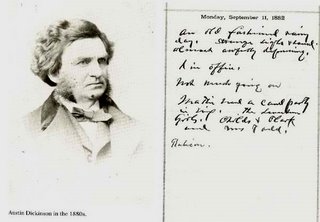 It was his Emily’s enthusiastic reception toward Mrs. Todd (Lavinia could never stomach Mabel) that caused Austin to make this irrevocable change in his life. The two ladies never met, but Emily would send Mabel notes, and Mabel would visit the home to play the piano downstairs while Emily listened from her hiding place. Austin and Mabel starting hooking up everywhere they could find a nook to hide out in: a carriage drive in the woods and empty rooms, including the Homestead dining room. As I said, “Rubicon” was entered into his diary, but Austin also wrote the word on a slip of paper, and he carried it in his wallet until his death. He also wrote out alternate letters to spell their names, and those slips were carried in Austin’s wallet and Mabel’s diary, tucked into the date December 13, 1883 which is believed to be the date they consummated their affair. Susan, Austin’s wife, knew of the affair, as did Mabel’s husband. David Todd took it in stride. He had his own thang going on with other women, but Susan suffered from this alliance and felt its effects and repercussions until the end of her life. I always wondered how she felt, following Austin’s death, to go through his personal effects and find his love letters and these cryptic slips of paper. Having cleared out relative’s homes following their death, and finding their pornography collection in a purple velvet Crown Royal bag in the work bench, all I can say is, “think about what you save.” You never know.
It was his Emily’s enthusiastic reception toward Mrs. Todd (Lavinia could never stomach Mabel) that caused Austin to make this irrevocable change in his life. The two ladies never met, but Emily would send Mabel notes, and Mabel would visit the home to play the piano downstairs while Emily listened from her hiding place. Austin and Mabel starting hooking up everywhere they could find a nook to hide out in: a carriage drive in the woods and empty rooms, including the Homestead dining room. As I said, “Rubicon” was entered into his diary, but Austin also wrote the word on a slip of paper, and he carried it in his wallet until his death. He also wrote out alternate letters to spell their names, and those slips were carried in Austin’s wallet and Mabel’s diary, tucked into the date December 13, 1883 which is believed to be the date they consummated their affair. Susan, Austin’s wife, knew of the affair, as did Mabel’s husband. David Todd took it in stride. He had his own thang going on with other women, but Susan suffered from this alliance and felt its effects and repercussions until the end of her life. I always wondered how she felt, following Austin’s death, to go through his personal effects and find his love letters and these cryptic slips of paper. Having cleared out relative’s homes following their death, and finding their pornography collection in a purple velvet Crown Royal bag in the work bench, all I can say is, “think about what you save.” You never know.But life, being weary of these worldly bars,
Never lacks power to dismiss itself.
If I know this, know all the world besides,
That part of tyranny I do bear
I can shake off at pleasure.
Tuesday, January 09, 2007
Monday, January 08, 2007
Va Va Voom Volver

Rather than write about Pedro Almodóvar’s new movie, Volver, starring Penélope Cruz, (go see the movie,) or the delights of seeing Penélope lisp her way through pure Cathstilian (go see the movie,) or the depiction of strong, self-sufficient women (go see the movie,) or the contrasts between life in a small village versus the larger urban village (:::tapping out with pencil "go see the movie":::,) what I kept thinking about while viewing this film was how much it reminded me of the Neorealism films from Italy following World War II. Neorealist directors like Rossellini, De Sica, Visconti and Fellini.
 There are certain traits that make neorealism film distinct: you will generally see a cast of nonprofessionals with known actors playing against type, shot on location mostly in poor neighborhoods and the countryside showing life among the impoverished performing fairly mundane tasks.
There are certain traits that make neorealism film distinct: you will generally see a cast of nonprofessionals with known actors playing against type, shot on location mostly in poor neighborhoods and the countryside showing life among the impoverished performing fairly mundane tasks. All of these things were present in Volver. At the start of Volver, Cruz, as Raimunda, is scrubbing her parents grave with the other ladies in her childhood village on the assigned day to tidy the cemetery.
All of these things were present in Volver. At the start of Volver, Cruz, as Raimunda, is scrubbing her parents grave with the other ladies in her childhood village on the assigned day to tidy the cemetery. Having read in advance that she was wearing a prosthetic butt, and given the director's habit of lingering shots on her swaying ass and cleavage, I was definitely on the lookout for the va va voom factors. I kept thinking about Anna Magnani, and sure enough, later in the film, there is one scene where the mother (ghost or real?) of Raimunda is watching an old film of Visconti's called Bellissima starring Anna Magnani in all of her black slip splendor.
Having read in advance that she was wearing a prosthetic butt, and given the director's habit of lingering shots on her swaying ass and cleavage, I was definitely on the lookout for the va va voom factors. I kept thinking about Anna Magnani, and sure enough, later in the film, there is one scene where the mother (ghost or real?) of Raimunda is watching an old film of Visconti's called Bellissima starring Anna Magnani in all of her black slip splendor. When I would watch these old fims on television as a child, it seemed to me that Magnani spent the bulk of her film career wearing a black slip, particularly in Tennessee Williams' The Rose Tattoo, also starring Burt Lancaster.
When I would watch these old fims on television as a child, it seemed to me that Magnani spent the bulk of her film career wearing a black slip, particularly in Tennessee Williams' The Rose Tattoo, also starring Burt Lancaster. Early Sophia (Loren) or Anna or any of the other Italian actresses of that era gave off an earthiness and hair tousled realism that was very appealing to see in an actress, and they weren't afraid of looking bad in the name of art. It can still be seen today in films like Notes on a Scandal with Judi Dench or Kate Winslet's frustrated frump in Little Children.
Early Sophia (Loren) or Anna or any of the other Italian actresses of that era gave off an earthiness and hair tousled realism that was very appealing to see in an actress, and they weren't afraid of looking bad in the name of art. It can still be seen today in films like Notes on a Scandal with Judi Dench or Kate Winslet's frustrated frump in Little Children. I'm seeing this film rather late in the day. It has been out a while now. Nonetheless, going to an early in the day screening, weeks after release, and the theatre was still packed. Almodóvar seems to have a deep understanding of women: how they care for each other, the ties that bind, and sacrifices a woman will make to spare her family.
I'm seeing this film rather late in the day. It has been out a while now. Nonetheless, going to an early in the day screening, weeks after release, and the theatre was still packed. Almodóvar seems to have a deep understanding of women: how they care for each other, the ties that bind, and sacrifices a woman will make to spare her family. In the past, I had zero interest in Penélope Cruz, I had never seen an Almodóvar film, but Volver has turned me around completely in my thinking about the actress and her director. With themes of family and community, of finding personal strength and a healing that can come even from beyond the grave, there is something in this film for everyone.
In the past, I had zero interest in Penélope Cruz, I had never seen an Almodóvar film, but Volver has turned me around completely in my thinking about the actress and her director. With themes of family and community, of finding personal strength and a healing that can come even from beyond the grave, there is something in this film for everyone.

